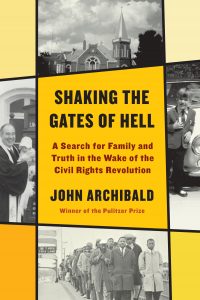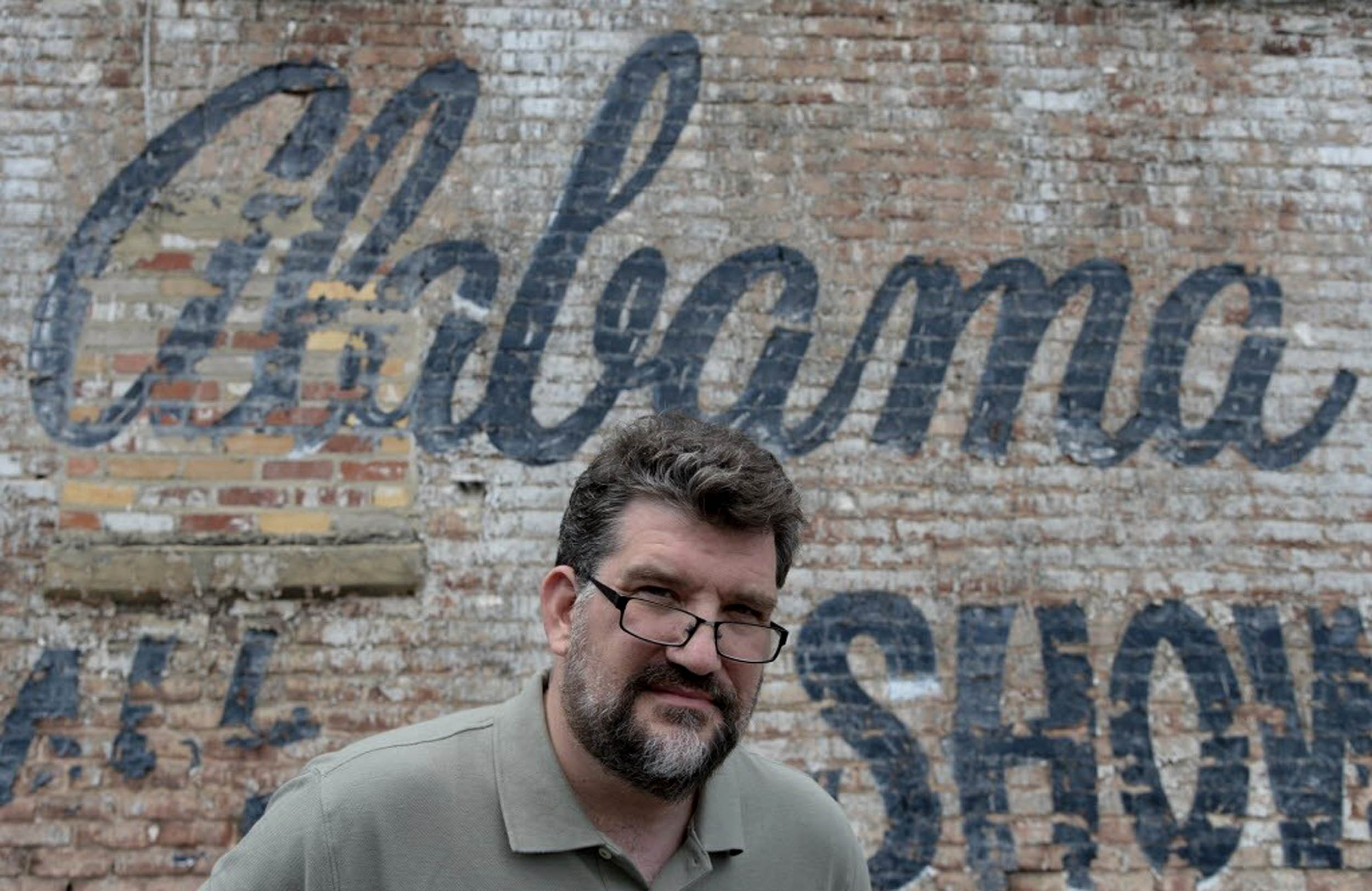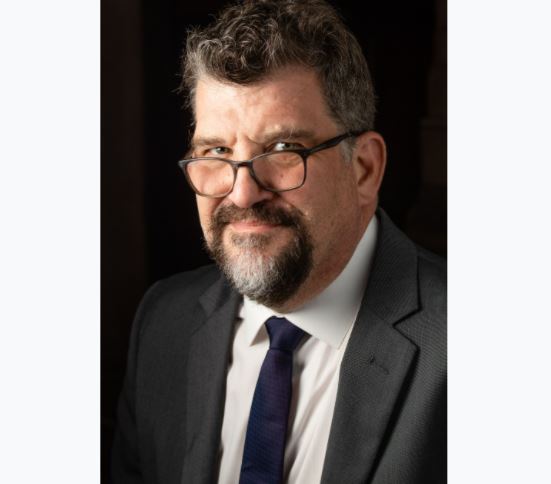By Solomon Crenshaw Jr.
For the Birmingham Times
For John Archibald, it began with silence. What he describes as “white silence.”
The Pulitzer Prize–winning columnist for Alabama Media Group writes of the deafening silence from the pulpits of white churches in his 320-page biographical memoir, “Shaking the Gates of Hell: A Search for Family and Truth in the Wake of the Civil Rights Revolution.”
Available on March 9, Archibald’s book tells of “an all-American white boy, son of a long line of Methodist preachers, in the midst of the Civil Rights revolution and discovering the culpability of silence within the church,” according to promotional material.
During a recent interview from Cambridge, Massachusetts, where the author is studying under a Nieman Fellowship at Harvard University for the 2020–2021 academic year, Archibald said, “The story of me starts with white silence, which is why this book just  rolled out of me … because all of those things in that moment in time when [the Rev. Dr. Martin Luther King Jr. in his ‘Letter from a Birmingham Jail’] was saying, ‘Where are you?’ to the white ministers. ‘Where are you and why are you not with us? I expected you to be with us.’
rolled out of me … because all of those things in that moment in time when [the Rev. Dr. Martin Luther King Jr. in his ‘Letter from a Birmingham Jail’] was saying, ‘Where are you?’ to the white ministers. ‘Where are you and why are you not with us? I expected you to be with us.’
“And I would say the same thing,” the author continued. “Where were you? It starts with a beautiful letter … that’s not just beautiful. It’s beautiful in its words, but it’s damning too.”
The Rev. Robert L. Archibald Jr. was one of those white preachers. He was pastor of the Central United Methodist Church in Alabaster, Alabama, from the late 1950s until 1963. He would go on to pastor other churches after that, including stops at Rainbow City Methodist Church, Grace Methodist Church of Birmingham, and Alabaster’s Central Methodist Church (now Alabaster First Methodist). John, the pastor’s youngest son, would learn from reading his father’s sermons after the elder’s death at age 83 in 2013 that he didn’t always preach what he practiced.
“If you have a pulpit and you don’t use it, what good are you?” the author asks in an interview. “And if you don’t use your pulpit to speak out against evil, I keep asking myself, ‘Can you be a good person?’ I don’t know the answer to that. I think that if you have a position of responsibility to lead people toward goodness and you don’t explicitly condemn the badness around them, then you’re at fault.”
“Lots of Parables”
Archibald was born in April 1963 in the Birmingham suburb of Alabaster during a tumultuous time that would see the assassination of U.S. President John F. Kennedy and the brutal killing of four Black girls in Birmingham’s Sixteenth Street Baptist Church. Center stage was King, the leader of the Civil Rights Movement, which sought to reverse generations of segregation and inequality. King would have gladly shared the stage with white clergy, but many were largely in the wings, unwilling to make their voices heard. Or silent.
Archibald’s memoir weaves domestic politics with family and religion as only a preacher’s kid might. The writer said his parents made it clear in how they lived that people—Black and white—are equal. Still, his father never explicitly said that when he spoke on Sundays to his congregation.
“I love my dad dearly, and I think he was a great person,” Archibald said. “He taught me the things that I think are important in life and that I try to say to other people in terms of equality and kindness and trying to understand people and all that.”
Archibald recalls a conversation about race with his father right before he died and after the son had written about race. The writer recalls his father suggesting that he wished he – the dad — had said more.
“There were references to lots of parables, lots of parables,” John said of the sermons he found among his late father’s papers. “But you can’t tell a white supremacist a parable and expect him to relate it to himself. There was very little specific condemnation of hatred and disagreement with discrimination at a time and a place in the world when it was the single most important thing.”
“His Name Is John”

Archibald has two brothers, Mark and Murray, and a sister, Mary Beth. Each has a first name that begins with the letter M, except him. Family lore says John was supposed to have been named Andrew and called Andy for short. That changed, he’s been told, when his father came in, picked him up and dramatically declared, “His name is John.”
“My mother insists I was actually named after John Rutland, who was a Methodist preacher that was a little bit older than my dad,” Archibald said.
Coincidentally, Rutland was the pastor at Woodlawn Methodist Church, whose members included Theophilus Eugene “Bull” Connor, the segregationist Birmingham commissioner of public safety who sicced dogs on and had blasts of water from fire hoses fired at Blacks.
Archibald said Rutland would preach about issues of Civil Rights, and Connor would stand up, say horrible things like he wasn’t going to take this “N-word preaching any more,” and storm out.
“[Connor and Rutland] had some legendary battles, but that’s one of the things that bothered me in the book,” said Archibald, who learned later in life of his connection to Rutland. “If I was named after this guy, you would have thought that I would have known all those stories about the stance he made in his own pulpit. I had to find that out on my own years later. It was just sort of that mystery of what I was hearing at home was not necessarily what was going on in the world.”
Two Loves
There are two stereotypes of a preacher’s kid, known to many as a PK. Either he is viewed as being holier than thou or he is thought to be breaking commandments before his dad can say, “Thou shalt not.”
Archibald says he’s been told he was “really sweet” when he was very young. He changed dramatically the summer after his fifth-grade year, he recalled, embracing his role as a negatively stereotypical preacher’s kid with a gusto that he almost regrets.
“I don’t really regret because I do believe philosophically that we are the sum of our scars,” he said. “It made me who I am. My mistakes made me who I am as much as anything else.
“I made a show of it,” Archibald continued. “I’d bring picnic lunches into the balcony at church and pass out sandwiches to my friends and stuff like that. … It didn’t always endear me with the ushers—or my dad.”
Archibald compares the children of Methodist preachers to Army brats because their families move so much. The Archibalds moved across Alabama to several congregations, including Monte Sano Methodist in Huntsville; Jacksonville First Methodist in Jacksonville; Decatur First United Methodist in Decatur; East Lake United Methodist in Birmingham, and First United Methodist of Huntsville.
John ultimately graduated from Birmingham’s L. Frazier Banks High School. Though the school had a student newspaper, Archibald didn’t work for it.
“I was only interested in sports and trouble,” he admitted. “I was delusional and thought I would play small-college football.”
The aspiring college player was a guard on the Banks Jets football team coached by David Cutcliffe, who now leads the Duke University Blue Devils. When Archibald enrolled at the University of Alabama, he walked into the office of the student newspaper, The Crimson White (The CW), with visions of becoming a sportswriter.
“I loved sports writing—reading, not doing,” he said. “I always think they are the best writers.”
Archibald found two loves when he walked into The CW office. He was attracted to journalism and became a columnist for the college paper. He was also attracted to Alecia, to whom he’s now been married for 33 years. The couple has two sons, Drew and Ramsey, and a daughter, Mamie.
“Shaking the Gates of Hell” is the first book written by Archibald, who received the Pulitzer Prize for Commentary in 2018. The first part of the book’s title, which he started writing in January 2019, is from a quote of John Wesley, the English evangelist and writer who founded Methodism. Wesley’s words are included before the table of contents: “Give me one hundred preachers who fear nothing but sin and desire nothing but God; … such alone will shake the gates of hell.”
“Shaking the Gates of Hell: A Search for Family and Truth in the Wake of the Civil Rights Revolution” is published by Penguin Random House; the hardcover version is $28 and will be available on March 9 from a broad range of booksellers, including Barnes and Noble, Books-a-Million, Amazon, Bookshop.org, Hudson Booksellers, IndieBound, Powell’s, Target, and Walmart.




